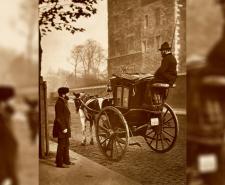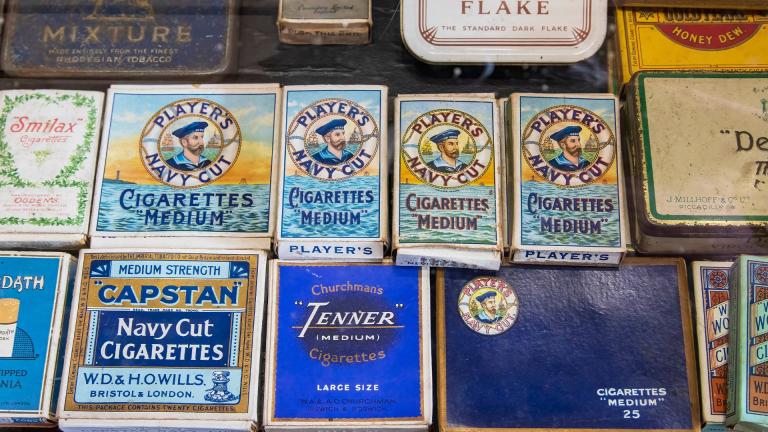
Read more about Health

Back in the ‘60s, you couldn’t watch TV without seeing someone light up. Cigarette ads were everywhere. Slick, confident and totally unbothered by the clouds of health warnings gathering on the horizon.
From handsome cowboys lighting up a Marlboro in the saddle to film stars pouting over packets of Players, smoking was sold as social and sexy. Some ads even claimed that smoking 'soothes the nerves', as though it was a medication.
At Sky HISTORY, we always love to unpack the difference between then and now. The cultural shifts that sneak up slowly, then suddenly feel seismic. And few shifts come bigger than the moment the UK passed the cigarette ad ban and pulled commercials off the air for good.
Marlboro’s famously sexy cowboys. Silk Cut’s mysterious purple slashes, the luxurious imagery of Benson & Hedges, the playful voice of Anchor and its maritime theme and catchy 'what shall we do with the drunken sailor' jingle.
Cigarette ads were creative, and the message was rarely about tobacco. It was about identity. Brands carved out personalities (glamorous, rebellious, rugged etc) and then invited smokers to find themselves in the image. For example, Princess Margaret famously smoked Chesterfields, a brand associated with glamour and a touch of rebellion.
John Lennon had a thing for Gauloises Bleues, French-made cigarettes with a reputation for creativity and defiance. They were also the brand of choice for icons like Pablo Picasso.
A few ads even tried to make smoking seem healthy. Post-tennis smokes, beach smokes, gym-adjacent smokes. It sounds absurd now but back then, it passed.
The cigarette ad ban happened in 1965, with surprisingly little fanfare. One day, cigarette brands were everywhere. The next, gone. They weren’t banned altogether, at least not yet. But the days of puffing your way through a primetime ad break were over. A tweak to the Television Act 1954 saw television cigarette adverts banned in 1965 and the industry never looked back.
The science, mostly.
In 1962, the Royal College of Physicians dropped a bombshell report linking smoking to lung cancer, heart disease and chronic bronchitis. It landed hard, but the culture hadn’t caught up. In the early ‘60s around 70% of men and 40% of British women smoked. Half of Britons also died before the age of 71. And advertising still glamorised it all.
Still, the message was spreading. By 1964, the Television Act handed the government new powers to regulate broadcasting. Within a year, cigarette commercials had vanished from TV screens.
Pipe tobacco and cigars got a pass (for the time being), but the big hitters were out.
Predictably, the tobacco industry kicked and screamed. So did the advertising industry, who warned of censorship. But the real surprise was how quiet most of the public were about it. There were no mass protests in defence of Benson & Hedges. No pub boycotts over Rothmans. People just… adjusted. Maybe they knew all along that inhaling anything other than air into your lungs was a bad idea…
It was the beginning of the end for advertisers. Billboards, radio, newspaper spreads… one by one, the channels were closed off. Tobacco sponsorship of sports, most notably Formula One, stuck around until 2005, but the writing had been on the wall for decades.
2009 saw some more big changes to legislation. Advertising was banned from vending machines, supermarket displays, and small shops under the Health Act.
In 2015 under the Children and Families Act, cigarettes were stripped of their packaging altogether. No more flashy logos, bright colours or metallic foil. Just a drab green-brown box, with a rotating slideshow of consequences where the branding used to be.
The cigarette ad ban was a turning point in how the government, and the population as a whole, viewed advertising. If a product was dangerous, should you be allowed to sell it with a catchy jingle? If an industry’s profits relied on illness and addiction, should it have space on your TV?
These were new questions. And once the line had been drawn, other industries started to feel the pinch. Alcohol. Gambling. Payday loans. Junk food… Not quite the Prohibition Era, but all faced scrutiny and eventually saw limits placed on how, where, and to whom they could advertise.
Fritz Gahagan, a former marketing consultant for big tobacco, summed it up well in a 1988 documentary.
'The problem is how do you sell death? How do you sell a poison that kills 350,000 people per year, 1,000 people a day? You do it with the great open spaces ... the mountains, the open places, the lakes coming up to the shore. They do it with healthy young people. They do it with athletes. How could a whiff of a cigarette be of any harm in a situation like that? It couldn’t be - there’s too much fresh air, too much health - too much absolute exuding of youth and vitality - that’s the way they do it.'
In that sense, the 1965 cigarette ad ban helped rewire the rules. Not just around tobacco, but around what responsible advertising looked like.
Richard Bevan is an MA Screenwriter/playwright who has written for television, radio and stage. He specialises in history and true crime writing.
The 1965 TV ban was a wake up call to the tobacco industry – not to clean up their act, but to fight back.
In the intervening years, the company’s lobbyists have successfully refocused the issue of cigarette advertising from the deaths of 350,000 people a year to one of 'freedom', 'censorship' and 'personal choice'. Their success is a tribute to their skills and the effectiveness of the same advertising and promotion they sought to downplay in the decision people made in taking up smoking in the first place.
Try to imagine the launch today of a highly addictive energy drink that smells at a distance, discolours your teeth and kills you in a protracted painful way a decade before you would have died otherwise – 'But now with extra sexy!'
It has been a hard-fought battle, but since the abolition of cigarette advertising on TV 60 years ago, more steps have been taken, smoking rates have dropped in the UK to around 10% and life expectancy has increased to 81 years.
Is it any wonder that the government is coming for our gambling, sugary snacks and vaping ads?
Enjoy insightful articles like this? Join the Sky HISTORY newsletter for weekly features, historical rabbit holes and unique stories delivered straight to your inbox.